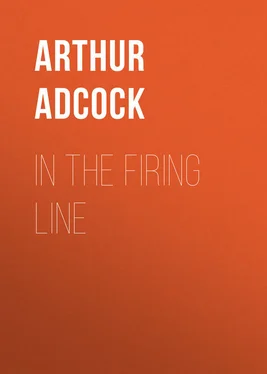Arthur Adcock - In The Firing Line
Здесь есть возможность читать онлайн «Arthur Adcock - In The Firing Line» — ознакомительный отрывок электронной книги совершенно бесплатно, а после прочтения отрывка купить полную версию. В некоторых случаях можно слушать аудио, скачать через торрент в формате fb2 и присутствует краткое содержание. Жанр: foreign_antique, foreign_prose, на английском языке. Описание произведения, (предисловие) а так же отзывы посетителей доступны на портале библиотеки ЛибКат.
- Название:In The Firing Line
- Автор:
- Жанр:
- Год:неизвестен
- ISBN:нет данных
- Рейтинг книги:3 / 5. Голосов: 1
-
Избранное:Добавить в избранное
- Отзывы:
-
Ваша оценка:
- 60
- 1
- 2
- 3
- 4
- 5
In The Firing Line: краткое содержание, описание и аннотация
Предлагаем к чтению аннотацию, описание, краткое содержание или предисловие (зависит от того, что написал сам автор книги «In The Firing Line»). Если вы не нашли необходимую информацию о книге — напишите в комментариях, мы постараемся отыскать её.
In The Firing Line — читать онлайн ознакомительный отрывок
Ниже представлен текст книги, разбитый по страницам. Система сохранения места последней прочитанной страницы, позволяет с удобством читать онлайн бесплатно книгу «In The Firing Line», без необходимости каждый раз заново искать на чём Вы остановились. Поставьте закладку, и сможете в любой момент перейти на страницу, на которой закончили чтение.
Интервал:
Закладка:
Last week when I got this wound in my leg it was because I got excited in an argument with wee Georgie Ferriss, of our company, about Queen’s Park Rangers and their chances this season. One of my chums was hit when he stood up to light a cigarette while the Germans were blazing away at us.
Keep your eyes wide open and you will have a big surprise sooner than you think. We’re all right, and the Germans will find that out sooner than you at home.
You will be surprised to hear I am home from Belgium in hospital with a slight wound in my heel from shrapnel. I had a narrow escape in Wednesday’s battle at or near Mons, as I was with the transport, and it was surrounded twice.
The last time I made holes in the stable wall, and had a good position for popping them off – and I did, too; but somehow they got to know where we were, and shelled us for three hours. Off went the roof, and off went the roof of other buildings around us. At last a shell exploded and set fire to our cooking apparatus and our stables. We had twenty-two fine horses, and all the transport in this stable yard. We hung on for orders to remove the horses. None came. At last a shell like a thunderbolt struck the wall, and down came half the stables, and as luck would have it, as we retired – only about six of us – my brother-in-law, the chap you were going to start when we were called up, went to the right and I went to the left. Just then a shell burst high and struck several down in the yard – it was then I got hit – smashed the butt of my rifle, and sent me silly for five minutes. Then I heard a major say, “For yourselves, boys.” I looked for my brother-in-law, but he was not to be seen, and I have not heard of him since. During all this time the fire was spreading rapidly. I was told to go back and cut the horses loose. I did so, and some of them got out, but others were burnt to death.
Then God answered my prayer, and I had strength to run through a line of rifle fire over barbed wire covered by a hedge, and managed to get out of rifle range, three hundred yards or four hundred yards away, and then I fell for want of water. I just had about two teaspoonfuls in my bottle, and then I went on struggling my way through hedges to a railway line.
When I got through I saw an awful sight – a man of the Royal Irish with six wounds from shrapnel. He asked me for water, but I had none. I managed to carry him about half a mile, and then found water. I stuck to him though he was heavy and I was feeling weak and tired. I had to carry him through a field of turnips, and half way I slipped and both fell. I then had a look back and could see the fire mountains high.
I then saw one of my own regiment, and called to him to stay with this man while I went for a shutter or a door, which I got, and with the help of two Frenchmen soon got him to a house and dressed him. We were being shelled again from the other end of the village then. We were about fifteen strong, as some slightly wounded came up and some not wounded. We got him away, and then met a company of Cameron Highlanders, and handed him over to them.
I think I marched nearly sixty-three miles, nearly all on one foot, and at last I got a horse and made my way to Mons, where I was put in the train for Havre.
Our first brush with the enemy was on August 21st, about thirty miles from Mons, but Mons, my goodness, it was just like Brock’s benefit at Belle Vue, and you would have thought it was hailing. Of course, we were returning the compliment. The Germans always found the range, which proved they had good maps, yet in their anxiety they tried to fire too many shells, the consequence being that a lot of them were harmless, and they did not give themselves time to properly fuse them. Only on one day – from the 21st to my leaving – did we miss an action. In General French’s report you will, no doubt, see where the 5th Brigade accounted for two of the German cavalry regiments, of which only six troopers were taken prisoners; the rest bit the dust. One of these regiments was the Lancers, of which the late Queen was honorary colonel.
Talk about a time! I would not like to go through the same again for love or money.
It is not war. It is murder. The Germans are murdering our wounded as fast as they come across them. I gave myself up for done a week last Sunday night, as we were in the thick of the fight at Mons. Our regiment started fighting with 1,009 and finished with 106 and three officers. That made 109, as we just lost 900. It was cruel. At one place we were at there were six streets of the town where all the women were left widows, and were all wearing the widows’ weeds. The French regiment that fought there was made up in the town and they got wiped out.
The poor Argylls got pretty well hit, but never wavered a yard for all their losses. The Scots Greys are doing great work at the front – in fact they were the means of putting ten thousand Germans to their fate on Sunday morning. I will never forget that day, as our regiment left a town on the French frontier on Saturday morning at 3 o’clock and marched till 3 a.m. on Sunday into a Belgian town. I was about to have an hour in bed, at least a lie down in a shop, when I was wakened to go on guard at the General’s headquarters, and while I was on guard a Captain of the crack French cavalry came in with the official report of the ten thousand Germans killed. The Scots Greys, early that morning, had decoyed the Germans right in front of the machine guns of the French, and they just mowed them down. There was no escape for them, poor devils, but they deserve it the way they go on. You would be sorry for the poor Belgian women having to leave their homes with young children clinging to them. One sad case we came across on the roadside was a woman just out of bed two days after giving birth to a child. The child was torn from her breast, and her breast cut off that the infant was sucking. Then the Germans bayoneted the child before the mother’s eyes. We did the best we could for her, but she died about six hours after telling us her hardships.
You thought it was a big crowd that streamed out of the Crystal Palace when we went to see the Cup Final. Well, outside Compiègne it was just as if that crowd came at us. You couldn’t miss them. Our bullets ploughed into them, but still they came for us. I was well entrenched, and my rifle got so hot I could hardly hold it. I was wondering if I should have enough bullets, when a pal shouted, “Up, Guards, and at ’em!” The next second he was rolled over with a nasty knock on the shoulder. He jumped up and hissed, “Let me get at them!” His language was a bit stronger than that.
When we really did get the order to get at them we made no mistake, I can tell you. They cringed at the bayonet, but those on our left wing tried to get round us, and after racing as hard as we could for quite five hundred yards we cut up nearly every man who did not run away.
You have read of the charge of the Light Brigade. It was nowt to our cavalry chaps. I saw two of our fellows who were unhorsed stand back to back and slash away with their swords, bringing down nine or ten of the panic-stricken devils. Then they got hold of the stirrup-straps of a horse without a rider, and got out of the melée. This kind of thing was going on all day.
Читать дальшеИнтервал:
Закладка:
Похожие книги на «In The Firing Line»
Представляем Вашему вниманию похожие книги на «In The Firing Line» списком для выбора. Мы отобрали схожую по названию и смыслу литературу в надежде предоставить читателям больше вариантов отыскать новые, интересные, ещё непрочитанные произведения.
Обсуждение, отзывы о книге «In The Firing Line» и просто собственные мнения читателей. Оставьте ваши комментарии, напишите, что Вы думаете о произведении, его смысле или главных героях. Укажите что конкретно понравилось, а что нет, и почему Вы так считаете.












